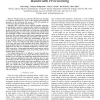Free Online Productivity Tools
i2Speak
i2Symbol
i2OCR
iTex2Img
iWeb2Print
iWeb2Shot
i2Type
iPdf2Split
iPdf2Merge
i2Bopomofo
i2Arabic
i2Style
i2Image
i2PDF
iLatex2Rtf
Sci2ools
128
click to vote
INFOCOM
2006
IEEE
2006
IEEE
Predictability of WLAN Mobility and Its Effects on Bandwidth Provisioning
ŌĆö Wireless local area networks (WLANs) are emerging as a popular technology for access to the Internet and enterprise networks. In the long term, the success of WLANs depends on services that support mobile network clients. Although other researchers have explored mobility prediction in hypothetical scenarios, evaluating their predictors analytically or with synthetic data, few studies have been able to evaluate their predictors with real user mobility data. As a ’¼ürst step towards ’¼ülling this fundamental gap, we work with a large data set collected from the Dartmouth College campus-wide wireless network that hosts more than 500 access points and 6,000 users. Extending our earlier work that focuses on predicting the next-visited access point (i.e., location), in this work we explore the predictability of the time of user mobility. Indeed, our contributions are two-fold. First, we evaluate a series of predictors that re’¼éect possible dependencies across time and space while bene’¼...
Related Content
| Added | 11 Jun 2010 |
| Updated | 11 Jun 2010 |
| Type | Conference |
| Year | 2006 |
| Where | INFOCOM |
| Authors | Libo Song, Udayan Deshpande, Ulas C. Kozat, David Kotz, Ravi Jain |
Comments (0)

